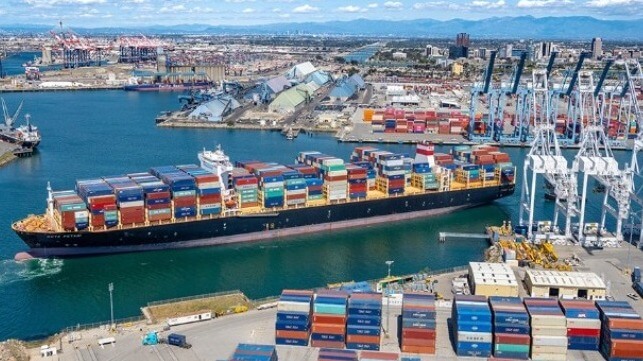Trade Groups Urge Biden to Get Involved in West Coast Union Contract

With U.S. ports, and especially those on the West Coast, struggling to recover from the backlogs developed in 2021, a group of 49 trade associations from retailing, manufacturing, and other industries is highlighting the potentially damaging effects that could come from the upcoming labor negotiations for West Coast dockworkers. The industry leaders sent a letter to the White House on March 1 urging the Biden administration for “early and persistent” engagement in the impending contract negotiations to advert any further disruptions to the U.S. supply chain.
“We implore your early and persistent engagement in the impending contract negotiations between the Pacific Maritime Association and the International Longshore and Warehouse Union,” the groups write in their letter address to the president and vice president. “Though negotiations have yet to begin ahead of the contract’s July 1st expiration, the uncertainty is already affecting operations on the ground.”
The letter is signed by a broad coalition of organizations ranging from the influential U.S. Chamber of Commerce to representatives of retailing, manufacturing, food, fashion, forwarders, and hobbies including fly fishing. The letter follows a similar statement a week ago from the National Retail Federation directed to the leaders of the union and the employers’ association.
In their appeal to the White House, the organizations point out that the “looming contract negotiations on the west coast could undermine,” the efforts of the administration over the past months to enhance the flow of goods and reduce the congestion in the ports. They highlight that the west coast ports collectively account for 44 percent of national container port traffic. They welcomed the efforts of the administration’s Supply Chain Disruptions Task Force to provide a whole-of-government response to address near-term supply chain challenges to the economic recovery, along with the appointment of John Porcari as the port envoy.
They point to past labor issues for the potential impact any disruption around the contract could have this summer. Previous labor disputes they estimated cost the U.S. economy upward of $1 to $2 billion each day while saying the stakes are higher in 2022. “Even a relatively short port slowdown or shutdown,” they warn, “could compound inflation pressure and cause long-standing damage to consumer confidence and American businesses.”
Though the contract expiration is four months away, they report that importers and exporters are wary of further disruption. They said that businesses are already adjusting freight strategies to avoid or mitigate potential impacts to keep goods moving and that these adjustments are already influencing volumes and market share.
Expectations have been growing between both shippers and carriers that the upcoming labor negotiations could be contentious and lead to significant disruptions at the major west coast ports. The organizations acknowledged the importance of targeted investments and the need for modernization of the infrastructure including automation and new technology that enables supply chain interoperability and end-to-end visibility. Automation is expected to be one of the hardest issues. The organizations also recognized the importance of the dockworkers and their role in maintaining the supply chain.

that matters most
Get the latest maritime news delivered to your inbox daily.
“We ask the Biden-Harris Administration to compel the parties to address these important issues now to ensure our supply chains are fully prepared to support continued economic growth and mitigate potential disruptions. Our associations support efforts by your administration to encourage and, if necessary, convene the parties to facilitate negotiations. Swift action and consistent attention to this matter can safeguard our shared economic gains and protect the progress your administration has made in addressing supply chain disruption and port congestion.”
Last week, the National Retail Federation wrote to the International Longshore and Warehouse Union and the Pacific Maritime Association urging both groups to begin negotiations early to reach a contract agreement that would ensure continued cargo growth for the region. NRF warned that a delay in contract negotiations would negatively impact retailers and other stakeholders that rely on West Coast ports and may force retailers and other shippers to reevaluate their use of U.S. West Coast ports.
